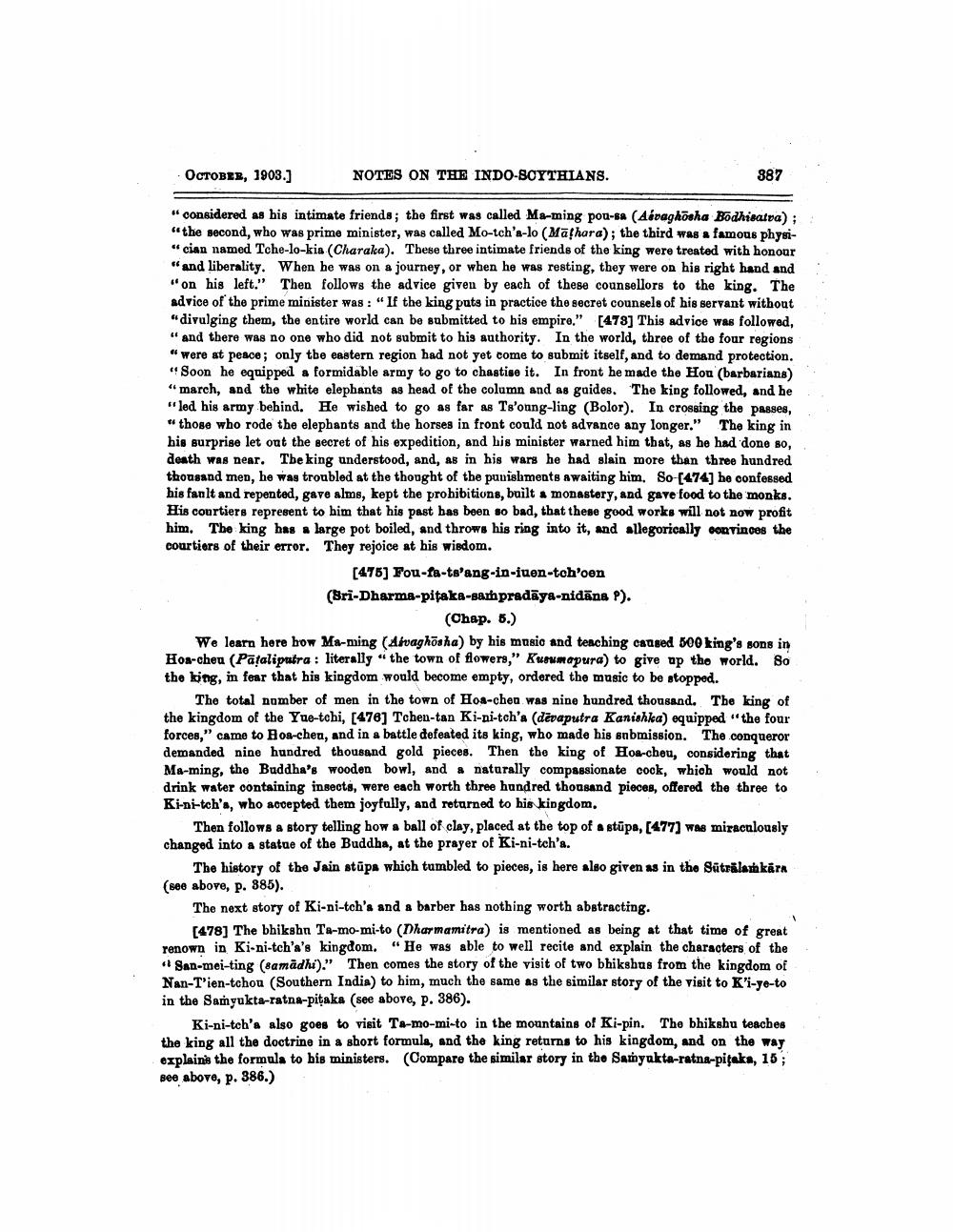________________
OCTOBER, 1903.]
NOTES ON THE INDO-BOYTHIANS.
887
" considered as his intimate friends; the first was called Ma-ming pou-sa (Asvaghosha Bodhisatra); “the second, who was prime minister, was called Mo-tch'a-lo (Mathara); the third was a famous physi"cian named Tche-lo-kia (Charaka). These three intimate friends of the king were treated with honour "and liberality. When he was on a journey, or when he was resting, they were on his right hand and "on his left." Then follows the advice given by each of these counsellors to the king. The advice of the prime minister was: "If the king pats in practice the secret counsels of his servant without "divulging them, the entire world can be submitted to his empire." [479] This advice was followed, "and there was no one who did not submit to his authority. In the world, three of the four regions "were at peace; only tbe eastern region had not yet come to submit itself, and to demand protection. "Soon he equipped a formidable army to go to chastise it. In front he made the Hou (barbarians) "march, and the white elephants as head of the column and as guides. The king followed, and he "led his army behind. He wished to go as far as Ts'oung-ling (Bolor). In crossing the passes, " those who rode the elephants and the horses in front could not advance any longer." The king in his surprise let out the secret of his expedition, and his minister warned him that, as he had done so, death was near. The king understood, and, as in his wars he had slain more than three hundred thousand men, he was troubled at the thought of the punishments awaiting him. So-[474] ho confessed his fanlt and repented, gave alms, kept the prohibitions, built & monastery, and gave food to the monks. His courtiers represent to him that his past bas been so bad, that these good works will not now profit him. The king has a large pot boiled, and throws his ring into it, and allegorically convinces the courtiers of their error. They rejoice at his wisdom.
[475] Fou-fa-ts'ang-in-igen-tch'oen (Sri-Dharma-pitaka-sampradāya-nidāna P).
(Chap. 6.) We learn hore how Ma-ming (Afvaghosha) by his music and teaching caused 500 king's sons in Hoa-cheu (Pataliputra : literally " the town of flowers," Kusumapura) to give up the world. So the king, in fear that his kingdom would become empty, ordered the music to be stopped.
The total number of men in the town of Hoa-chen was nine hundred thousand. The king of the kingdom of the Yue-tohi, [476] Tchen-tan Ki-ni-tch's (devaputra Kanishka) equipped the four forces," came to Hoa-chen, and in a battle defeated its king, who made his submission. The conqueror demanded nine hundred thousand gold pieces. Then the king of Hoa-cheu, considering that Ma-ming, the Buddha's wooden bowl, and a naturally compassionate cook, which would not drink water containing insects, were each worth three hundred thousand pieces, offered the three to Ki-ni-tch'a, who accepted them joyfully, and returned to his kingdom.
Then follows a story telling how a ball of clay, placed at the top of a stūpa, [477) was miraculously changed into a statue of the Buddha, at the prayer of Ki-ni-tch'a.
The history of the Jain stūpa which tumbled to pieces, is here also given as in the Süträlam kåra (see above, p. 885).
The next story of Ki-ni-tch's and a barber has nothing worth abstracting.
[478] The bhikshn Ta-mo-mi-to (Dharmamitra) is mentioned as being at that time of great renown in Ki-ni-tch's's kingdom. "He was able to well recite and explain the characters of the * San-mei-ting (samadhi)." Then comes the story of the visit of two bhikshas from the kingdom of Nan-T'ien-tchou (Southern India) to him, much the same as the similar story of the visit to K'i-ye-to in the Samyukta-ratna-pitaks (see above, p. 386).
Ki-ni-tch's also goes to visit Ta-mo-mi-to in the mountains of Ki-pin. The bhikshu teaches the king all the doctrine in a short formula, and the king returns to his kingdom, and on the way explains the formula to bis ministers. (Compare the similar story in the Samyukta-ratna-pitaka, 15; see above, p. 386.)




